A brief history of Olympic dissent: Munich 1972
Over the last week or so I've been writing a series of posts looking at the history of dissent, politics and protest at the Olympics. 1968 was the first time that lives were lost on account of the Games. A political demonstration in the Tlatelolco area of Mexico City ended in state organised violence, killing hundreds of students, just days before the Olympics were due to begin. In 1972 in Münich, death came to the Games itself, with a terrorist attack on the Olympic Village ultimately claiming the lives of 11 members of the Israeli Olympic Delegation.
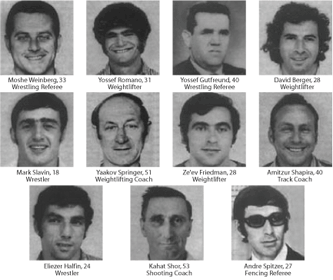
The 'carefree' games
The 1972 Olympics in Münich were the second occasion Germany hosted the event. The first time, in 1936, was deeply political, as Hitler and the Nazi party used the event for a stage-managed propaganda display of their supposedly model society. After the horrors of war, Germany was not initially allowed to compete in the Games, and when it did so it was eventually to be as a team split between the Westernised Federal Republic of Germany, and the Soviet-dominated German Democratic Republic of East Germany.
1972 was an opportunity for the Germans to erase from memory the 'Nazi' Games, and instead replace them with a Games held in a carefree spirit. Security was light, and spending was concentrated on having fun, reflected in an abstract 'happy' logo for the games.

That isn't to say that there were not security preparations. Famously, Dr. Georg Sieber prepared a set of worst-case scenarios for the Games, which included an eerily accurate prediction of exactly what transpired. One of his scenarios was of a highjacked plane being crashed into the stadium, but it was scenario 21 - terrorists with sympathies for the Palestinian cause breaking into the Olympic Village and kidnapping members of the Israeli Olympic squad - that happened.
The hostage crisis and the media
Although it was still a few years before rolling 24 hour news channels were developed, the fact that the attack happened at the Olympic Village meant there were plenty of media around. The 1936 Games had been relayed on big screens within Berlin, and the 1948 Games had been the first shown live on TV. Since then, media coverage had increased exponentially, with the 1964 Games from Tokyo being the first time live pictures were broadcast over the Pacific from Japan to the USA.
The 1972 hostage crisis unfolded live on televisions around the globe. The Münich Massacre was one of the first "made for television" terrorist atrocities designed to bring attention to the Palestinian cause. On several occasions during the crisis it seemed that the kidnappers were able to follow police preparations to tackle them by simply turing on their television sets. Images of the murderers from the world's TV screens became one of the defining images of international terrorism.
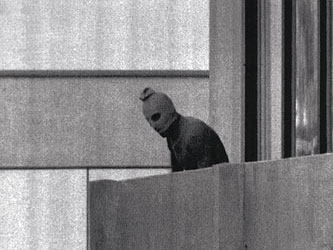
Moshe Weinberg and Yossef Romano were murdered prior to the scene of the hostage crisis being shifted to a military airport at Fürstenfeldbruck. It was there that a failed rescue attempt ended up with the 9 remaining Israeli hostages being murdered.
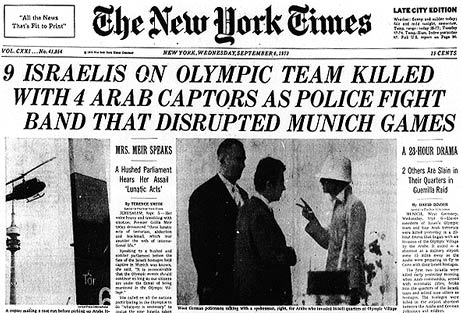
Olympic memorials
At first the Games continued during the crisis, but eventually they were halted for a few hours. When they were re-started, it was with a memorial service held in the Olympic Stadium, attended by many of the competing athletes.
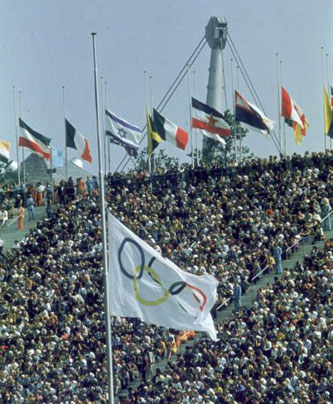
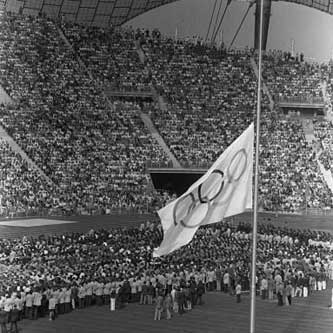
Ten nations opposed to the existence of the State of Israel requested that their flags not be flown at half-mast during the ceremony. As disrespectful as this was to the spirit of Olympic competition, the IOC acquiesced and granted this request. There was a move to cancel the rest of the Games, but in the end they continued, a decision which the Israeli authorities agreed with. [1]
Not all the athletes stayed however, and the Israeli team did not continue to compete in the Games. The entire Egyptian team withdrew as well. The destination the terrorists had asked to be flown to was Cairo, and the Egyptian team felt there would be bad feeling directed towards them. Various other individual athletes left the Games as well, with Jos Hermens being quoted as saying:
"You give a party, and someone is killed at the party, you don't continue the party. I'm going home."
As well as the ceremony held during the Olympics in 1972, there is now a plaque at the stadium and at the site of the Münich Olympic Village. A memorial also featured as part of the complex that housed the 2000 Olympics in Sydney. There is also an individual memorial to David Berger in the U.S., which was restored in recent years, and in 1996 the Atlanta Jewish Federation unveiled a statue and held a memorial service, which was attended by members of the Palestine Olympic Committee.
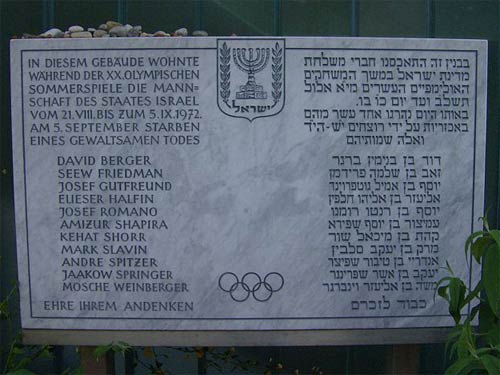
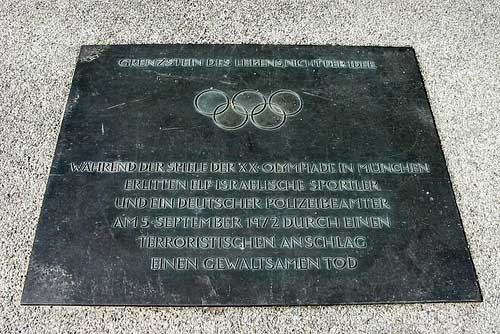

Over the years there has been a concerted campaign for the Olympic Movement itself to give more of a official memorial and acknowledgement of what happened. However, the IOC has resisted - no doubt in part motivated by the fact that several members of the Olympic Movement are still implacably opposed to the very existence of Israel.
Conspiracy theories
As seems inevitable with any major terrorist attack in the West, various conspiracy theories have attached themselves to events in 1972. These do not generally concern the events of the kidnappings themselves, but events afterwards.
It is widely believed that a subsequent Lufthansa 'hijack' in West Germany, where the perpetrators called for the release of the surviving Münich terrorists was rather convenient for the German authorities. They were able to swiftly hand the suspects over to Libya, and avoid the embarrassment of a trial which might expose their failure to prevent the kidnapping and the deaths of the Israelis. In scenes that are lamentably still depressingly familiar today, those who had murdered unarmed civilians were treated as heroes of war upon their return.
Business as usual...
"I have placed it in my will that my wife and my children can never, ever receive that medal from the '72 Olympic games"
"It was sort of like being on top of the Sears tower in Chicago celebrating and then being thrown off and falling 100 floors to the ground. That's the kind of emptiness and sick feeling I felt."
Quotes from members of the 1972 USA Olympic Basketball team
It didn't take long for the sportsmen and women of the Games to get their usual sense of priorities back. Just 4 days after the 11 Israelis were murdered, all of the political dissent at the Games was focussed back on the Cold War. In what has been described as the most controversial match in the history of the sport, the USA team petulantly refused to accept their silver medals after a disputed call in the last 3 seconds of the final left the Soviet Union with the gold medals.
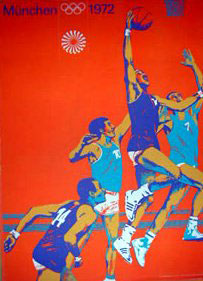
Next...
The 1976 Games in Montreal were a financial disaster, and the first to face dissent in the form of a widespread organised boycott from a group of nations for political reasons.
[1] The Wikipedia entry about the 1972 Münich Olympic Massacre also states that the Soviet Union insisted their flag be flown at full-mast. However, the source that the entry currently cites does not specifically mention the USSR, and I've not yet found another source on the Internet to verify this claim. [Return to article]
I was hoping someone would write a post like this. Thanks
The Olympics are over-hyped. What started out as a bit of fun for gentlemen has turned into a drugged-up greed-fest.
Good fun, but taken _way_ too seriously. And the _cost_ of it!
Hope this isn't off topic, but I remember the basketball game like it was yesterday. Livid? You bet. It blows me away how often these types of things happen in the Olympics. I still think though that the 1988 boxing match was the worst fix I ever saw. Whenever there are judges - the games can be manipulated. Nice article by the way Martin.
Do people now know the exact teriosts you killed this 11 inocient people during the olypics?
Srry, another comment i really like the details put into this peice becaouse i have read alot more articles on the 1972 olymics and they were terrible commpared to yours.
Just saying its really GOOD.